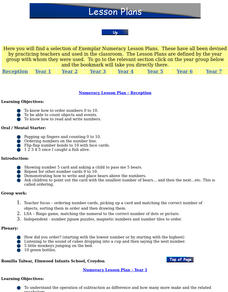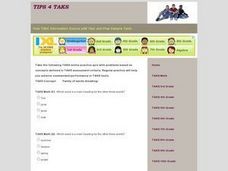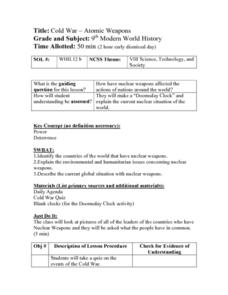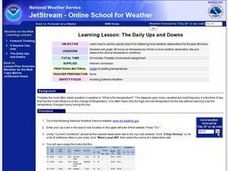Curated OER
Math Mammoth End of the Year Test--Grade 1
In this first grade math assessment learning exercise, 1st graders complete 22 math problems based on the topics that were taught in first grade. The topics include telling time, solving word problems and addition and subtraction...
Curated OER
Time for All Ages
Fourth graders discover time keeping by analyzing technological advances in history. In this time lesson plan, 4th graders create and complete a KWL chart based on their research of a famous timekeeping invention, such as a sundial....
Curated OER
What Time Is It?
In this telling time to the hour worksheet, students analyze 4 clocks and figure out what time each displays. Students cut out 4 digital times and paste them correctly underneath the clocks.
Curated OER
Judges in the Classroom Lesson Plan History Of The Bill Of Rights
Students study the Bill of Rights and the US Constitution. They investigate the authors of the Bill of Rights and play a game based on the research.
Curated OER
Numeracy Lesson Plan: Reception
Students examine number sense by participating in identification activities. In this number value instructional activity, students practice counting from 1-10, identifying number flash cards, reading clocks and multiplying basic numbers....
Curated OER
Rise of the Modern World
Students analyze art and examples of Cubism art. In this art analysis lesson, students analyze how artists use symbols and complete image based discussion. Students make a list of technological innovations and design a symbol for each...
MakingMusicFun.net
Ready, Set, Go! Intervals (Unison-Octave) Speed Test | Music Theory Worksheet (Digital Print)
In this music worksheet, learners identify 10 musical intervals based on the musical notes they see.
Curated OER
Judges in the Classroom Lesson Plan History Of The Bill Of Rights
Students study the US Constitution, The Bill of Rights, and other amendments. They investigate the people who obtained the Bill of Rights and play a game based on their studies.
Curated OER
Rhymes - 1
For this on-line language arts worksheet, students complete 10 multiple choice questions where they choose the word that rhymes with the bold word. Students can check their answers at the end of the worksheet.
Curated OER
Family Of Words (Heading)
In this on-line language arts instructional activity, learners complete 10 multiple choice questions where they choose the word that would be suitable as the main heading for other words listed below it. Students can check their answers...
Curated OER
Cold War-Atomic Weapons
Ninth graders explore how nuclear weapons have affected the actions of nations around the world. They identify the countries that have nuclear weapons and discuss the humanitarian issues with nuclear weapons. Students create a "Doomsday...
Curated OER
Barefoot and Pregnant
Young scholars address the problem of a reduction in the world population growth rate being offset by a growing world population base. This problem is particularly true with the rapid population growth in many Third World countries. The...
Curated OER
Learning Lesson: Ups and Downs
Young scholars use the internet to find the air temperatures in their area. They create a graph based on the data. They analyze the data and examine tips for avoiding extreme weather.
Curated OER
Emblems of the Land I Love
Students explore the histories of American patriotic emblems and examine ways in which patriotic artwork uses these emblems to reflect the ideals that they embody. They find a common or popular patriotic image and design a modern...
It's About Time
Special Relativity
According to Einstein's Theory of Special Relativity, time moves slower when you're working. That's not quite what it says, and in a hands-on lesson, pupils learn the actual theory. Scholars plot the half life of muons, then compare it...
Workforce Solutions
30 Seconds
Thirty seconds are all scholars have to develop an engaging commercial to showcase their talents and experience within a specific occupation. Pairs work collaboratively to keep each other on time to deliver information speedily and ask...
Calvin Crest Outdoor School
Survival
Equip young campers with important survival knowledge with a set of engaging lessons. Teammates work together to complete three outdoor activities, which include building a shelter, starting a campfire, and finding directions in the...
Curated OER
Science and Measurement
A great start to activate thinking about the scientific method, instruments, measurements, accuracy, constants and laws. Each slide describes important procedures and examples essential for the study of science.
Indiana University
World Literature: "One Evening in the Rainy Season" Shi Zhecun
Did you know that modern Chinese literature “grew from the psychoanalytical theory of Sigmund Freud”? Designed for a world literature class, seniors are introduced to “One Evening in the Rainy Season,” Shi Zhecun’s stream of...
Curated OER
Connect the Spheres: Earth Systems Interactions
Is everything really connected? Take your class on a walk outside, where they will make observations and write them down on a worksheet. Once they are back in the classroom, learners will work to determine if and how things like birds,...
Exploratorium
Geyser
Although it requires a little extra preparation the first time you use this geyser demonstration, it can be used repeatedly once it has been constructed. This demonstration is useful in showcasing how heat leads to increased pressure and...
DiscoverE
Product Dissection
Sometimes, taking things apart is more fun than putting things together. Groups of learners participate in a reverse engineering activity. They dissect a device of their choosing to see how it works—great hands-on learning from the...
Curated OER
Calendar Time
Use circle time to work on counting. Kindergarteners practice the months of the year, say the full date, chart the day's temperature, count to 100, and sing the alphabet song. This kind of daily routine cultivates deep roots for...
Curated OER
Measure
Students are asked what activities or things that they do each day. They are then asked do you do that in the morning, afternoon, or night? Students are then asked which of those things do you do first, second, third, and etc.

























